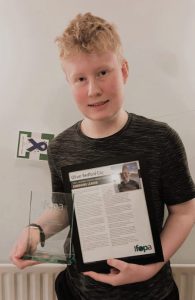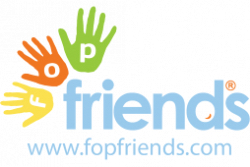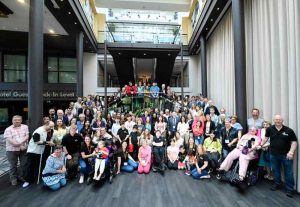One of our favourite reasons for doing exhibitions is getting meet lots of wonderful members of our community. It’s a great chance to talk to customers and professionals who use and recommend our gripping aids. We love to have conversations around solutions that people are looking for. We get some of our best product ideas from your queries!
Recently, at the Kidz to Adultz exhibition, we enjoyed meeting Helen from the charity FOP Friends. She helped us to understand more about the very rare condition her son, Oliver, was born with. Oliver is now 17. Helen runs the charity with the aim of fundraising for research, signposting and support for families and helping healthcare workers to become better informed. We were keen to find out more about this condition. We wanted to understand how our gripping aids could support those with FOP. Over email, we spoke to Helen and she kindly wrote this article to share with our community.
Tell us a bit about yourself and your family…
My name is Helen, I run the charity FOP Friends. Prior to running the charity, I was a primary school teacher for 20 years. I still miss this job.
I am married to Chris and we have three wonderful boys who make us proud every day. Oliver is 17, Leo, 15, and Harry 12. As a family, we love to go on long road trips for our holidays, around the USA. We visit new places – cities, theme parks, beaches and beautiful open spaces. We also get to meet new people from our FOP community who quickly become our friends.
Let’s meet Oliver
Oliver had a fairly ordinary childhood, with his FOP staying ‘quiet’ for the most part. However, the past 18 months has seen his FOP flaring up. This has resulted in some loss of movement and mobility from his hip flare. We are unsure if this is still ongoing. Oliver is no longer able to put his own shoes and socks on, or pick things up from the floor. He finds walking for even a short period of time now quite painful. It has been a difficult time for us as a family.
However, Oliver is defiant and is refusing to let FOP stand in his way. Oliver passed all his GCSEs last year and is currently studying Aviation and Travel at college. He is hoping to have a career either as a pilot or another role within the aviation industry. Oliver is a typical teenager and enjoys gaming. He also plays badminton, although that has become more of a challenge recently due to a hip flare restricting his movement and causing him pain. He has just started learning to drive and is loving it! He’s looking forward to the freedom and independence it will give him.
Oliver is a highly accomplished Scout. Last year, he achieved his Platinum Award, and he’s now pursuing the Diamond Award, Scouting’s highest honour. He also holds the Young Leader qualification. Beyond Scouting, Oliver has achieved his Silver Duke of Edinburgh Award and is currently working towards his Gold Award.
Oliver regularly gives speeches and presentations, sharing his story and life with FOP to raise awareness. He was recognised in 2023 with the IFOPA Emerging Young Leader Award for his advocacy.
Teach us some more about FOP – how is it diagnosed?
FOP is one of the rarest diseases known to medicine, affecting around 1 in a million people. There are around 70 known people with FOP in the UK, and only 1000 worldwide.
People with FOP are typically born with shortened, turned in or missing big toes. They are then misdiagnosed as hallux valgus. Then, unusual and unexplained swellings appear which are commonly misdiagnosed as cancer, which can lead to unnecessary and potentially harmful procedures.
It is the toes combined with the swellings which are the key diagnostic features of FOP. It is due to a fault in the ACVR1 gene. 97% of cases are known as classic, with some people having a variant of FOP. The majority of cases of FOP are de novo, although it can be passed down. It is variable and progressive, affecting different people in different ways and at different rates. Biopsy of these first swellings can lead to further FOP activity and flare ups.
Is FOP progressive?
FOP causes soft tissue, muscles and ligaments to turn into bone. It is the only condition known to medicine where one system turns into another. FOP causes ribbons of this new bone to grow throughout the body, often from the neck downwards. This takes away the mobility, joint by joint, of the person living with FOP. It creates a second skeleton. Flare-ups can happen spontaneously, however, FOP is accelerated by trauma. This can include a knock, bump, fall, intramuscular vaccination, surgery, or even a simple virus such as flu.
It is not possible to remove FOP bone as the surgery can trigger further flare-ups and subsequent bone growth, thus aggravating the FOP more. Bone growth in the muscles of the face and mouth can ‘lock’ a person’s jaw. This makes eating, talking and dental care extremely difficult.
Children with FOP often find that they lose movement in their shoulders, neck and arms at a young age. This makes playing with their friends very difficult. They may not be able to take part in sporting activities as the risk of an injury through a fall and triggering a flare-up is simply too great. However, many parents try to find a way to adapt whatever activity their child wishes to do, to make it safe. Children with FOP go climbing, dancing, gymnastics, horse riding and more – they just have to find their way. Hydrotherapy is good for those with FOP as it improves their breathing and the water supports the body.
FOP does not affect intelligence. People with FOP do well in school, with many going on to university and having successful careers.
Progression of FOP is usually gradual, with people losing mobility over the years. They often lose movement in one or both arms and the neck. Hip flares are also common. When people lose movement in the arms, they are unable to feed themselves. They often use tools to retain their independence. Brushing hair, dressing, cleaning teeth, everyday activities which people take for granted are impossible.
Can you introduce us to the work of FOP Friends?
When Chris and I received Oliver’s diagnosis, there was very little information about the condition. There was no UK charity to support families. There are only around 70 known people in the UK living with FOP, and fewer than 1000 in the world. We are ultra rare. As a family, we began to fundraise to support the research into FOP at the University of Oxford. In 2012, with the support of close family and friends, we became a registered charity. We have grown over the years, supporting those living with the condition and welcoming new families to our community. This was never part of our life plan. Chris and I are just doing what we can to help our son. We are now a national and internationally recognised patient organisation. We work with other FOP and rare disease organisations in the UK and globally.
FOP Friends aims to be there for everyone in the UK who are living with FOP. We hold biennial conferences in Manchester. There, we bring together families, healthcare professionals, researchers, and the world’s experts on FOP. We raise awareness of FOP with healthcare professionals to help prevent misdiagnosis. We signpost to other services and have created a tightknit community where people don’t feel alone. FOP Friends also stands with other rare organisations to improve the care those living with any rare disease receive. We have produced a range of resources to support our families. We’ve written a book to help schools support a child living with FOP. We also fundraise to support the research into a treatment for FOP.
In the Queen’s Jubilee Honours List, I was recognised for my work for the charity with a BEM.
How did you find Active Hands and how might we support those with FOP?
We met at a Kidz to Adultz exhibition a few years ago. It struck me that you offer a number of simple solutions to the every day problems those with FOP are faced with. Simple things have the power to make the world of difference to people living with mobility challenges.
Tools to support dressing and eating can be so helpful. The long handled bendable cutlery is perfect and has been unavailable for purchase for many years. So glad to have it back! The Flexi Phone Holder for holding devices is brilliant. Tech opens up a whole new world for those who can’t get out so easily. Many people with restrictions due to FOP use grabbers all the time – the Handi-Grip ones are amazing.
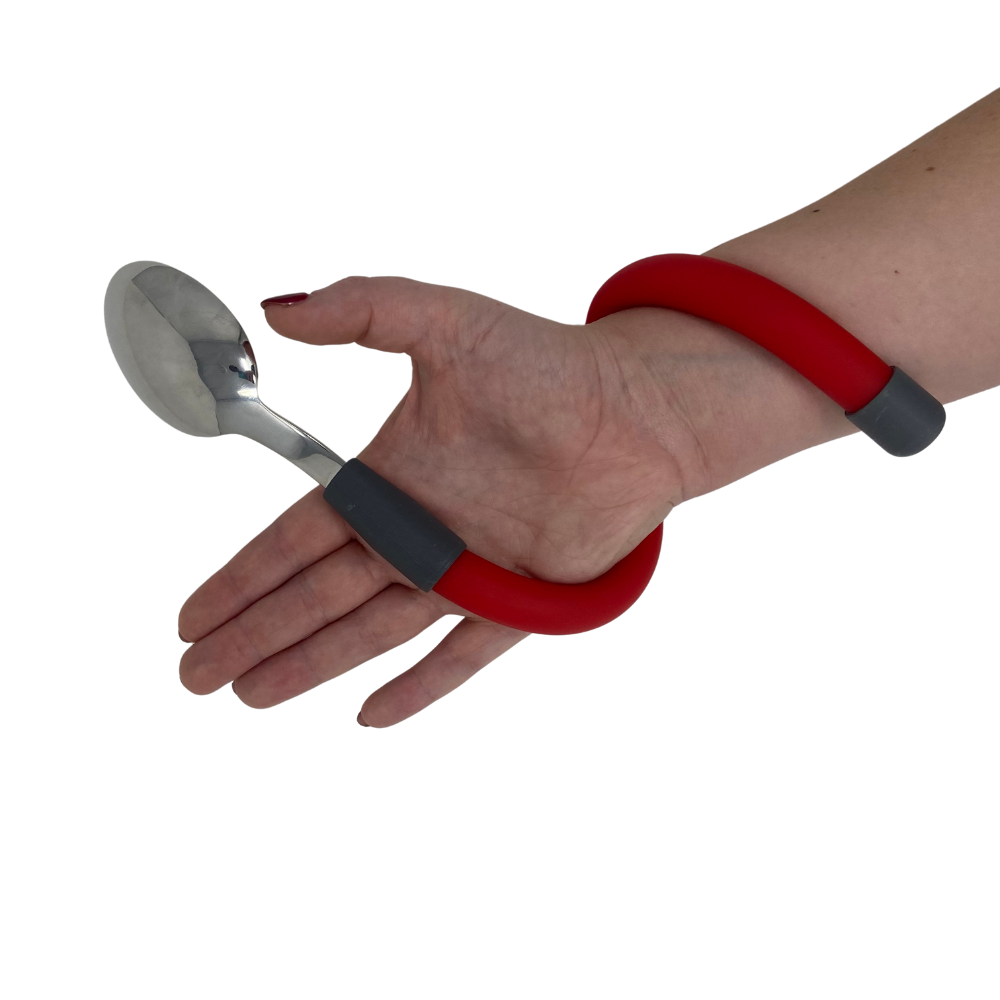
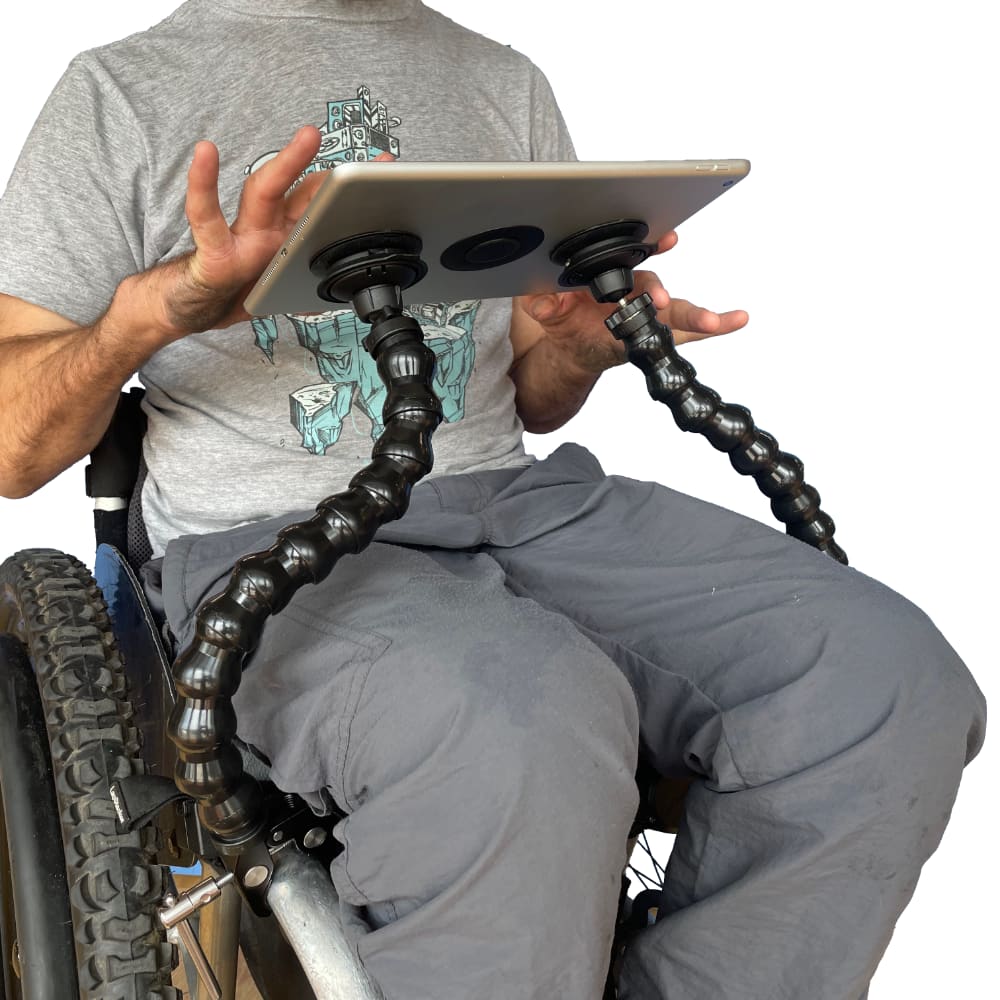
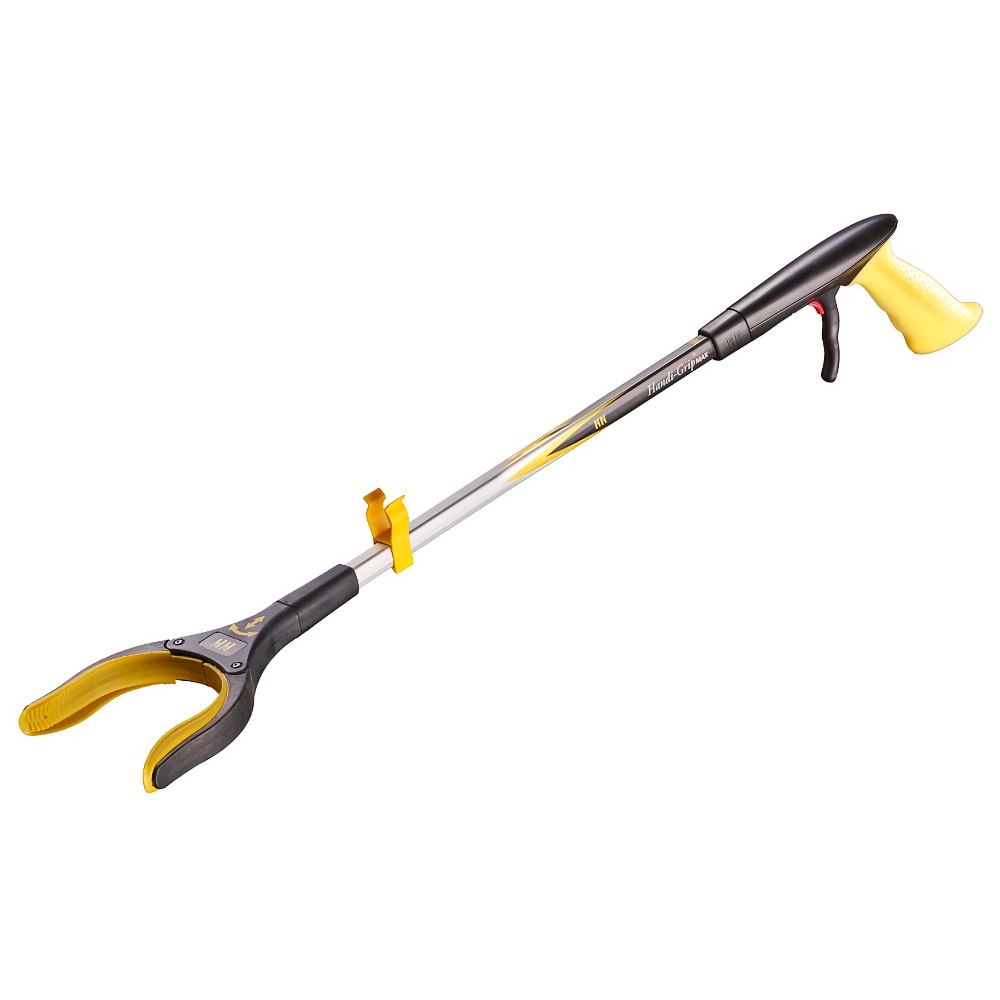
What does the future hold?
As a family, we will continue to support Oliver in pursuing his dreams. We have always looked for ways to say yes to him. Even though he’s nearly an adult, we will still do everything we can to give him every opportunity to succeed in life. His determination and resilience never ceases to amaze us and we are so very proud of him.
Currently, there is no available treatment for FOP in the UK. A drug has been approved for use in the USA, Canada and some other countries. But it did not receive approval in the EU and subsequently an application for approval in the UK wasn’t made. We have a number of trials in progress, with some showing real signs of promise. We just have to try to live the best life we can, while we live in hope for a treatment for Oliver and all the people we know and love who are living with FOP. Some days this is easier than others, and some days it seems impossible. But we do our best each and every day.
We hope FOP Friends will continue to make a positive difference to the lives of those affected by FOP, and the sister condition POH, in the UK and beyond, so that no family faces this journey alone. We hope that one day, FOP will be a treatable condition. Eventually we hope we will be able to say there is a cure.
How can people support FOP Friends?
We encourage people to follow us on social media and share our news and stories. Misdiagnosis is common, not just with FOP, but all rare diseases. We have FOP Awareness Month every April and we do FunFeet4FOP so please join in! If you are a healthcare professional, please share our information and facts about the toes, so that the time to diagnosis is reduced which in turn can help causing irreparable harm.
Helen Bedford-Gay
We are so grateful to Helen for taking the time out of her busy schedule to help us better understand FOP and we hope to continue to support this community in the future.
Jo Smith
The post FOP Friends appeared first on The Active Hands Company.
